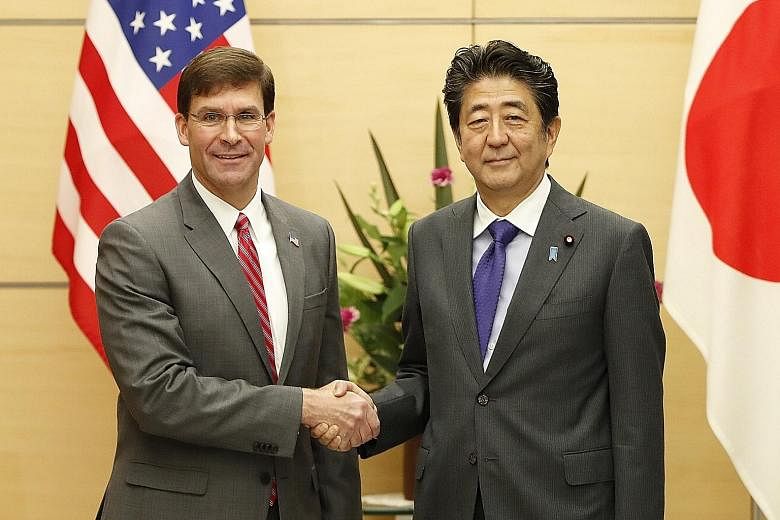TOKYO • United States Defence Secretary Mark Esper has urged Japan to consider taking part in a coalition to protect shipping in the Strait of Hormuz, as Washington struggles to garner support for its efforts to counter Iranian activities in the strategically important sea lane.
"Any and every country that has an interest in freedom of navigation and freedom of commerce needs to really consider (being) involved in this type of monitoring of the strait," he told reporters on Tuesday en route to Tokyo, where he was meeting Japanese Prime Minister Shinzo Abe and Defence Minister Takeshi Iwaya.
"I think it's something that the Japanese should strongly consider. I'll be discussing this with them."
Dr Esper, who is on his first overseas trip since taking office last month, raised the issue in a meeting with Mr Iwaya yesterday, said a Japanese government source.
But he did not bring it up with Mr Abe, Japanese Chief Cabinet Secretary Yoshihide Suga told a press conference.
Mr Iwaya told reporters later that he explained that Japan will think carefully about what role it can play in safeguarding ships in the Middle East, taking into consideration its oil needs and ties with both Washington and Teheran.
Enthusiasm for the plan among US allies has been mixed. Britain and Israel have announced their willingness to participate, while Germany has declined.
In the meeting with Mr Abe at the Premier's office, Dr Esper lambasted China for destabilising the Indo-Pacific region, saying its "military aggression and calculated strategy of predatory economics violates the international rules-based order that we are trying to uphold".
Mr Abe said the Japan-US security alliance has "never been stronger", a sentiment that Dr Esper echoed, calling it ironclad and crucial to a free and open Indo-Pacific region.
The defence chiefs agreed on the importance of three-way cooperation with South Korea to address threats from North Korea, Mr Iwaya told reporters, including an intelligence-sharing pact between Tokyo and Seoul that may be under threat, amid growing enmity between the neighbours over trade policy and wartime history.
Seoul has suggested that it may pull out of the bilateral General Security of Military Information Agreement, in response to Tokyo's tightening of export controls on some materials vital to the South Korean technology industry.
The pact, signed in November 2016, allows the neighbours to share sensitive information regarding North Korea. The deadline to decide whether to renew it for another year comes later this month.
Dr Esper is on a tour of the Asia-Pacific region, including Australia, New Zealand, Mongolia and South Korea. He is slated to meet South Korean Defence Minister Jeong Kyeong-doo in Seoul tomorrow.
KYODO

